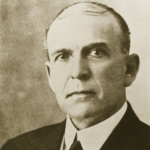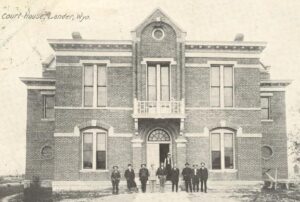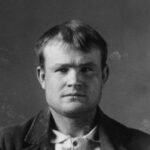 Douglas Arnold Preston was destined for great things in the state of Wyoming. Born on December 19, 1858, to Finney D Preston and Phoebe Mundy. He was admitted to the Illinois bar in 1878 and practiced law in Illinois courts until 1887. Then he decided to relocate to Cheyenne, Wyoming Territory. During his life in Wyoming, Preston was not only an attorney, but also a politician. He served as the 6th Attorney General of Wyoming from 1911 to 1919, as a member of the Democratic Party. He also served as a member of the Wyoming House of Representatives from 1903 to 1905, and as a member of the Wyoming Senate in 1929 until his death.
Douglas Arnold Preston was destined for great things in the state of Wyoming. Born on December 19, 1858, to Finney D Preston and Phoebe Mundy. He was admitted to the Illinois bar in 1878 and practiced law in Illinois courts until 1887. Then he decided to relocate to Cheyenne, Wyoming Territory. During his life in Wyoming, Preston was not only an attorney, but also a politician. He served as the 6th Attorney General of Wyoming from 1911 to 1919, as a member of the Democratic Party. He also served as a member of the Wyoming House of Representatives from 1903 to 1905, and as a member of the Wyoming Senate in 1929 until his death.
When Preston moved to Wyoming in 1887, he established a law office in Rawlins in partnership with John R Dixon. Apparently, Rawlins wasn’t his cup of tea, so the following year, he moved to Lander, where he continued his legal practice. In 1895, he again relocated, settling in Rock Springs, which became his long-term residence and base for his legal and political career.
While Preston’s political career was extensive, probably one of the oddest parts of his legal career was the fact that he was once retained as a defense attorney for the infamous Butch Cassidy. Cassidy and his cohort, Al Hainer, had been arrested on April 11, 1892, a seven-man posse led by Uinta County Sheriff John Ward and Deputy Sheriff Bob Calverly, and charged in Fremont County with grand larceny “involving the theft of a horse valued at forty dollars from the Grey Bull Cattle Company on or about October 1, 1891.” District Court Judge Jesse Knight set bond at $400 each and both men were released pending trial. The trial was delayed for more than a year, due mostly to problems encountered in locating one prosecution witness and several defense witnesses. During that time, Cassidy retained Douglas A Preston of Lander as his attorney. Preston was assisted by C F Rathbone.
Preston and Cassidy had crossed paths and become friends so retaining him made sense. Unsubstantiated  rumor has it that Cassidy and Preston met when Cassidy saved Preston from a beating in a saloon in Rock Springs. However, that rumor has been disputed, and since Cassidy was an outlaw, it seems odd that he would play the hero in that one situation. Nevertheless, the two men were friends, and Preston did defend Cassidy.
rumor has it that Cassidy and Preston met when Cassidy saved Preston from a beating in a saloon in Rock Springs. However, that rumor has been disputed, and since Cassidy was an outlaw, it seems odd that he would play the hero in that one situation. Nevertheless, the two men were friends, and Preston did defend Cassidy.
The trial finally began in Lander on June 20, 1893, with Judge Knight presiding. The trial was short and the defense simple. Cassidy and Hainer did not deny being in possession of the horses but maintained they had bought them from a man named Billy Nutcher in good faith, unaware they were stolen. Conveniently, though he had been subpoenaed to testify, Nutcher did not appear at the trial. Nor did two men Cassidy claimed had witnessed the transaction. In the end, the jury deliberated only a few hours before finding both men not guilty. The reality was that there was just not enough evidence.
As the trial progressed and a “not guilty” verdict appeared likely, rancher Otto Franc filed charges against Cassidy and Haines in the theft of different horses in August of 1891, valued at $50. Both were re-arrested and were once again freed on bond. The trial on the new charge opened on June 30, 1894. While Cassidy was found guilty, Hainer was once again acquitted. On July 10, Judge Knight sentenced Cassidy to two years at hard labor in the Wyoming State Penitentiary in Laramie. That pretty much ended the relationship with Preston and Cassidy, and Preston went on to focus on his political career.
Preston served as the prosecuting attorney for Richland County, Illinois from 1880 to 1894. By 1889, and now in Wyoming since 1887, Preston was selected as one of the Democratic delegates to the Wyoming Constitutional Convention. Their task was to draft the state’s constitution for submission to the US government  for statehood. From 1903 to 1905, Preston served in the Wyoming House of Representatives. Governor Joseph M Carey appointed him as Attorney General of Wyoming in 1911, and he was reappointed by Governor John B Kendrick in 1915.
for statehood. From 1903 to 1905, Preston served in the Wyoming House of Representatives. Governor Joseph M Carey appointed him as Attorney General of Wyoming in 1911, and he was reappointed by Governor John B Kendrick in 1915.
Preston was elected to the Wyoming Senate in 1928, but on October 8, 1929, he was involved in a car crash that left him with four broken ribs and a severe skull fracture. Unable to recover from his injuries, Preston died on October 21, 1929, in a hospital in Rock Springs, Wyoming. He was 70 years old. In the 1930 Wyoming state elections, his widow, Anna Preston, was nominated as the Democratic candidate for Wyoming Superintendent of Public Instruction.


Leave a Reply